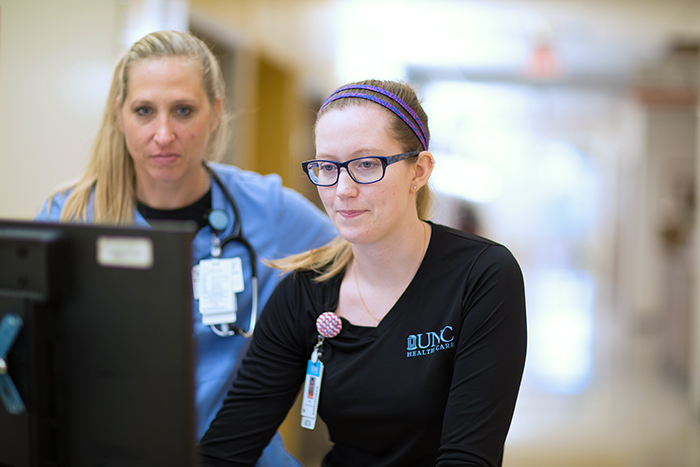
to coordinate patient care. (Photo by Brian Strickland)

by Matt Englund
For a patient with a difficult diagnosis or a complicated treatment plan, it can help to have a familiar face that greets them each time they come in for an appointment. At the N.C. Cancer Hospital, ranked 32nd in the nation in the 2015 U.S. News and World Report listing of the country’s best hospitals, nurses are on the front line of patient care, helping patients navigate their sometimes complicated treatment plans and serving as a point of contact between patient families and care teams.
“We operate in big multidisciplinary teams,” says Paula Stinson, RN, quality management coordinator for the bone marrow transplant program. “Nurse practitioners, physicians assistants, attending doctors, navigators, coordinators—cancer care has a lot of moving parts, and the nurse is at the center of all that.”
As cancer care has evolved over the past few decades, how nurses understand their role in the process has also changed dramatically. Part of this shift in perception has been a growing awareness of how substantial and far-reaching the ramifications of cancer diagnosis can be. Ann Hornback, RN, nurse manager in GYN-Oncology, emphasizes that the role of nursing goes well beyond symptom management.
“It’s holistic care that nursing can provide,” she says.
Often, this means helping patients with things that don’t directly relate to their cancer diagnosis. Nurses are able to offer this kind of holistic care because of the trusting relationships they are able to build with patients and their families.
Hornback adds, “In many ways, the whole family has cancer. If a family is 30 minutes late to an appointment, and they’re never late, you’re going to ask why. And if you’ve built up a relationship with this family, they’re more likely to tell you what’s going on.”
This kind of relationship can also play an important role in keeping patients healthy.
Because nurses spend so much time with their patients, they are often able to notice subtle changes in demeanor that may indicate big changes in a patient condition, says Ashley Farmer, RN, nurse manager at the UNC Hospitals Infusion Center.
“Our nurses are quick to pick up on changes in the patient’s condition because they get a chance to know them so well,” she says. “A patient might not be acting in the way they usually do, or they may seem depressed or confused. Because nurses spend so much time with these patients, they’re most likely to spot these kinds of changes.”
Building these kinds of relationships can also contribute to the emotional well-being of the patients, says Hornback.
“I think there’s a sense of peace the patients get when they get up on the floor and they see a familiar face.”
This is true whether cure is the patient’s goal or not. According to Farmer, some of the most difficult moments also can be those in which the nurse can make the greatest difference.
“Supporting a family when they’ve just received bad news can be challenging – to hold them while they cry, or hand them a tissue, or talk about what the next step might look like – but stepping into that role is an important part of the care a nurse is able to provide,” she says.
Long, physically demanding shifts combined with the emotional and psychological demands of caring for patients can take their toll. In recent years, burnout among health care personnel increasingly has been recognized as a problem within the industry.
UNC Health Care and the N.C. Cancer Hospital offer a number of ways to help nurses cope with emotional fatigue.
“UNC is very supportive and very aware of the emotional burdens that come with nursing,” says Farmer. “Within oncology, we just finished a compassion fatigue study that was led by our chaplain. It focused on the inpatient bone marrow transplant unit and outpatient infusion center. They met for a series of classes covering different techniques and practices for relieving stress.”
In addition to efforts like these, the Comprehensive Cancer Support Program staffs a nurse practitioner that helps support the nursing staff by rounding on the nurses to make sure they are staying healthy emotionally.
“She’s done a lot of support groups for staff,” says Farmer. “These organized efforts to support our staff are really important. The well-being of our staff has been a focus for the leadership in the cancer hospital.”
Added Stinson, “Our nurses do a really good job of taking care of our patients, but the hospital also has worked hard to take care of the people who take care of our patients.”
Part of this effort is not only making sure nurses have the support they need to maintain their emotional well-being, but also to provide opportunities to help them grow professionally.
“I’ve been nursing for 20 years, and I’m still learning things,” says Hornback. “I like the fact that UNC offers all these opportunities to learn outside your concentration. It helps keep your interest level high, and it helps with patient care. Oncology is a huge field, and UNC gives you the opportunity to finds something that’s right for you and helps you grow in that.”
Lisa Ecklund, RN, a clinical nurse for inpatient hematology/oncology, enjoys that she is encouraged to pursue research and quality improvement opportunities.
“We’re constantly looking at research issues and quality improvement issues on the floor. We have a clinical practice group on our floor that I co-chair,” she says. “Groups like these are a good way to make a difference by ensuring our nursing care is aligned with the current evidence-based practices in the literature.”
Nurses at the N.C. Cancer Hospital are not only involved in trying to improve practices on the floor; they are encouraged to get involved at the level of hospital policy as well, says Farmer. “We have a shared governance structure. Bedside nurses are encouraged to be on these practice groups to have a say in policy. This kind of structure allows nurses to collaborate with leaders and administration on how best to implement best practice.”
Whether it is at the policy level or at the bedside, however, the focus for nurses at the N.C. Cancer Hospital is always the patients. For Hornback, that means helping to lift her patients up.
“Even with the sickest of the sick, I do my best to make sure that whatever time I get to spend with them and their families is good time, quality time. It may sound strange, but the cancer hospital is a happy place. Our patients come in here with their future in mind. They’re full of hope.”
To learn more about the N.C. Cancer Hospital and the UNC Lineberger Comprehensive Cancer Center, visit their website at https://unclineberger.org/